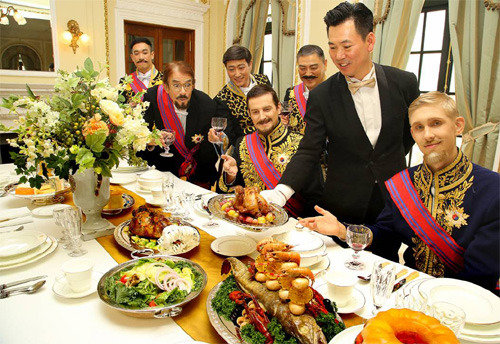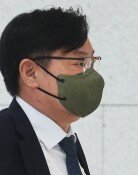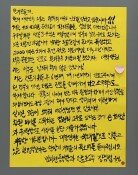Imperial dinner table reenacted to commemorate Korean Empire proclamation
Imperial dinner table reenacted to commemorate Korean Empire proclamation
Posted October. 12, 2017 08:33,
Updated October. 12, 2017 09:21

At the reenactment ceremony held at the Westin Chosun Hotel in central Seoul, the imperial dinner menu was unveiled. Among 12 courses were Kneel consommé, clear soup with meatballs; pheasant breast with grapes; foie gras pate, crispy pie filled with meat, fish and minced vegetables; grilled beef tenderloin with truffles; and lamb steak. Plum flower-patterned tableware and table setting symbolizing the royal family were also reproduced.
French style dinner in the 19th century was a global practice. Menus were written in French. Korean servants showed the dishes in a large bowl and served them to the guests.
“I never imagined that such a well-organized French dinner culture would have been established during the Korean Empire,” said Yoo Jae-deok, the chief chef of the menu development team at the Chosun Hotel. “We developed menus based on the 19th-century French recipes as well as ice cream molds and cooking utensils held in the National Palace Museum.
The Korean Empire, which wanted to join the modernization trend, embraced Western culture by signing treaties with Japan in 1887, and then with the United States, the United Kingdom, Germany, Russia and France. The mode of establishing diplomatic relations also changed into diplomatic representatives staying for a long period in each country. Protocol at that time compromised Western formality and traditional manners. Caviar, salmon, coffee and other ingredients that did not grow in the country were imported.
For the Korean Empire’s banquet reenactment project, the Cultural Heritage Administration, the Cultural Heritage National Trust, Shinsegae Chosun Hotel, and Baehwa Women’s University concluded a business agreement in May this year and have carried out. Based on the research led by Professor Son Jung-woo at Baehwa Women’s University, the Chosun Hotel cooking team developed the recipe.
“The Korean Empire was the last lineage of royal court cuisine and the watershed period that embraced Western food,” said the professor. “This project has renewed the interest in and contributed to study on food culture of this period.”
Yeun-Kyung Cho yunique@donga.com
Headline News
- Med professors announce intention to leave hospitals starting Thursday
- Bridge honoring Sgt. Moon Jae-sik unveiled in Pennsylvania
- Chief of Staff Chung tells presidential secretaries to stay away from politics
- US FTC bans noncompete agreements
- N. Korea launches cyberattacks on S. Korea's defense companies







